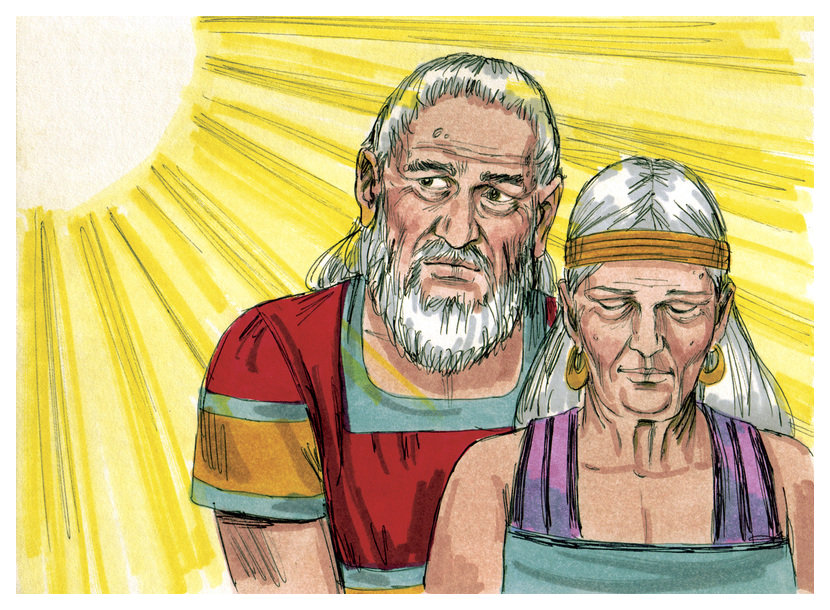Previously we saw that Abraham obtained righteousness simply by believing the covenant G-d made to him. This was stated in the little sentence:
Abram believed the LORD, and he credited it to him as righteousness. (Genesis 15:6)
Righteousness prior to circumcision and the Law
We should not miss when this took place. The covenant of circumcision is given later in Genesis 17. Abraham was credited righteousness here in chapter 15 – before circumcision. So, circumcision was not the cause of his righteousness. Neither was observance of Moses’ Covenant since that was given hundreds of years later. The active ingredient for Abraham’s righteousness was his belief.
But belief in what?
Belief is about trusting the Covenant

Distant Shores Media/Sweet Publishing, CC BY-SA 3.0, via Wikimedia Commons
Think what ‘believe’ means. Many people think that ‘believe’ means believing that G-d exists. We think that G-d just wants us to believe that He is there. It is true that Abraham believed in G-d’s existence, but that is not the point of his righteousness. G-d had made a covenant with Abraham that He would give him a son. It was that Covenant or promise that Abraham had to choose to believe or not – even while he knew that he was in his 80’s and Sarah was in her 70’s. He trusted that G-d would somehow fulfill that promise to him. Belief, in this story, is trust. Abraham chose to trust G-d for a son.
When Abraham chose to believe that promise of a son then G-d also gave him – ‘credited’ him– righteousness. In the end Abraham got both the covenant promise (a son from whom Israel would come) and righteousness.
Righteousness – not from merit or effort
It does not say that Abraham ‘earned’ or ‘merited’ righteousness; it was ‘credited’ to him. What is the difference? If something is ‘earned’ you work for it – you deserve it. It is like receiving wages for the work you do. But when something is credited to you, it is given to you. It is not earned or merited, but simply given to be received.


We instinctively think that more rigorously keeping Jewish observances, or doing more good things than bad things, practicing more self-denial, or meeting obligations enables us to deserve or merit righteousness. Abraham proves this thinking false. He did not try to earn righteousness. He simply chose to believe the promise covenanted to him, and righteousness was given to him.
Abraham’s Belief: He bet his life on it
Choosing to believe in this promise of a son was simple but it was not easy. When he was first promised a ‘Great Nation’ he was 75 years old and he had left his home country and traveled to Canaan. Almost ten years had passed and Abraham and Sarah still did not have a child – let alone a nation. “Why has G-d not already given us a son if he could have done so”? he would have wondered. Abraham believed the covenant of a son because he trusted G-d, even though he did not understand everything about the promise, nor did he have all his questions answered.
Believing the covenant required active waiting. His whole life was interrupted while living in tents waiting for the promise. It would have been much easier to make excuses and return home to Harran (modern-day Iraq) that he had left many years earlier, and where his brother and family still lived. Life was comfortable there. The fact that he stayed in the Promised Land demonstrated his trust, maintained even at personal cost and comfort. His trust in the promise made a difference in how he lived his life.
His trust in the promise took priority over normal goals in life – security, comfort and well-being. He could have disbelieved the promise while still believing in the existence of G-d and continuing with religious observances and good deeds. Then he could have maintained his religion but not been ‘credited’ righteousness.
Four hundred years later, the covenant mediated by Moses at Sinai did not nullify this covenant with Abraham. Moses built on it. G-d is one who is willing to make multiple covenants, anticipating that the covenant receiver will experience the blessing of each one.
Our Example
The rest of the Bible treats Abraham as an example for us. Abraham’s belief in the covenant from G-d, and the crediting of righteousness, is a pattern for us to follow. We can see this in Isaiah
New International Version – Isaiah 51:1-2 | Orthodox Jewish Bible – Isaiah 51:1-2 |
| Listen to me, you who pursue righteousness and who seek the Lord: Look to the rock from which you were cut and to the quarry from which you were hewn; 2 look to Abraham, your father, and to Sarah, who gave you birth. When I called him he was only one man, and I blessed him and made him many. | Pay heed to Me, ye that pursue tzedek, ye that seek Hashem; look unto the Tzur from where ye are cut, and to the quarry from where ye were hewn. 2 Look unto Avraham Avichem, and unto Sarah that gave birth to you; for I called him as one alone, and put a brocha on him, and made him many. |
If we pursue and desire righteousness then we are called to follow Abraham’s example – to actively trust the covenants of G-d with Israel. Today we know that promise to Abraham has come true. We also know that G-d made several more covenants. The covenant through Moses at Mount Sinai probably receives the most attention. But there are several other covenants, each pregnant with promises, which occur through the Tanakh. For example, consider the covenant prophesied by Jeremiah around 600 BC.
Covenant Promise of a new Heart
New International Version – Jeremiah 31:31-34 | Orthodox Jewish Bible – Jeremiah 31:31-34 |
| “The days are coming,” declares the Lord, “when I will make a new covenant with the people of Israel and with the people of Judah. 32 It will not be like the covenant I made with their ancestors when I took them by the hand to lead them out of Egypt, because they broke my covenant, though I was a husband to them” declares the Lord. 33 “This is the covenant I will make with the people of Israel after that time,” declares the Lord. “I will put my law in their minds and write it on their hearts. I will be their God, and they will be my people. 34 No longer will they teach their neighbor, or say to one another, ‘Know the Lord,’ because they will all know me, from the least of them to the greatest,” declares the Lord. “For I will forgive their wickedness and will remember their sins no more.” | Hinei, the days come, saith Hashem, that I will cut a Brit Chadasha with Bais Yisroel, and with Bais Yehudah; 32 (31) Not according to the Brit that I cut with their Avot in the day that I took hold of their yad to take them out of Eretz Mitzrayim; which My Brit they broke, although I was Ba’al (Husband) to them, saith Hashem; 33 (32) But this shall be the Brit that I will cut with Bais Yisroel [T.N. OJBC is Jewish]; After those days, saith Hashem, I will set My Torah in them inwardly, and I will write ketuvim on their hearts; and I will be their Elohim, and they shall be My People. 34 (33) And they shall teach no more every ish his re’a (neighbor), and every ish his brother, saying, Know Hashem; for they shall all have da’as of Me, from the katon of them unto the gadol of them, saith Hashem; for I will forgive their avon, and I will remember their chattat no more. |
This promised covenant is expressly given to the ‘people of Israel’ and was to come in effect sometime after Jeremiah since it was given in the future tense. It would build on the Sinai covenant by writing the law in hearts and minds as opposed to stone tablets, promising that all ‘will know’ G-d and receive His forgiveness.
Following Abraham’s example
We all have the opportunity to follow Abraham’s example with these covenants, choosing whether to trust or not. When Abraham first received the promise of land in Canaan it was not immediately clear whether this implied remaining in the land or moving to Egypt to avoid famine (Genesis 12:10-20). When Abraham was given the promise of a son it was not immediately clear if this was going to happen through Sarah or her servant Hagar (hence the events of Genesis 16, and the divorce in Genesis 21 with the effects felt even today). Abraham was not perfect in his trust, but he did not give up, working through all the issues that his journey of faith brought before him.
As his physical descendants, Jews should be the first to follow Abraham’s example, learning about and taking hold of all the covenants offered by G-d. Like Abraham it will require a life-long journey, some agonizing choices, thinking differently than the crowd, with many opportunities to turn back. But as well as receiving the promised son and being credited righteousness, Abraham also obtained something else equally precious. As G-d, through the pen of Isaiah said of him.
… Abraham my friend… (Isaiah 41:8)
Friendship with the One who created space and time, birthed the nation of Israel, and who is mysteriously guiding her steps thousands of years later is certainly worthwhile. Since these ancient promises seem to be stirring to life in our day, why not understand the covenants to better generate wise decisions? And why not tackle the one that is most puzzling – the covenant that reiterated blessings to ‘all nations’ because of the obedience of Abraham in the testing of the sacrifice of his son Isaac.
i enjoyed the story of the bible regarding Abraham. and his faith so is strong and confident with all his heart and mind that what he had been waiting for did happened. this has also taken me into a question about the Egyptians. since the Egyptians were the people who enslave the people of Abraham from what tribe are we to recognise the Egyptians? what tribe were they. were they simply strong and has the power and dominance and knowledge about their master? were the Egyptians the people of God too? why are they favored? were they faithful too? in the past?that they and their generations were blessed?
were the story of the Bible only for the people who were raw, and has no religion during those times? until God tried to help them by giving the the power of hearing and understanding of the power of omnipotent?
are we suppose t believe that the earlier we know and have faith in our Master G-d, the better our generations to come through his blessings and teachings?is this the nature of our survival as human species? the one and only way to be saved? if this is so, its easier than we thought. while it might be hard to live with our brothers and sisters if they wont practice discipline and common sense. In todays’ time, we see in the media outlet about our different kinds of people lost in their own misgivings, anger and decision of act of revenge, that they do danger and harm to other people. there is terrorism in different parts of our world. and ll because they are hurt and wanted to express their emotions through showing what they felt about life. if we only need faith, may be we need to learn how to have faith in the right way. we all wanted to believe. and not always what we expect comes at a right time. and i thank the message given by the sermon speaker today. May G-d enlightened, guide us and guard us. May G-d less us all.